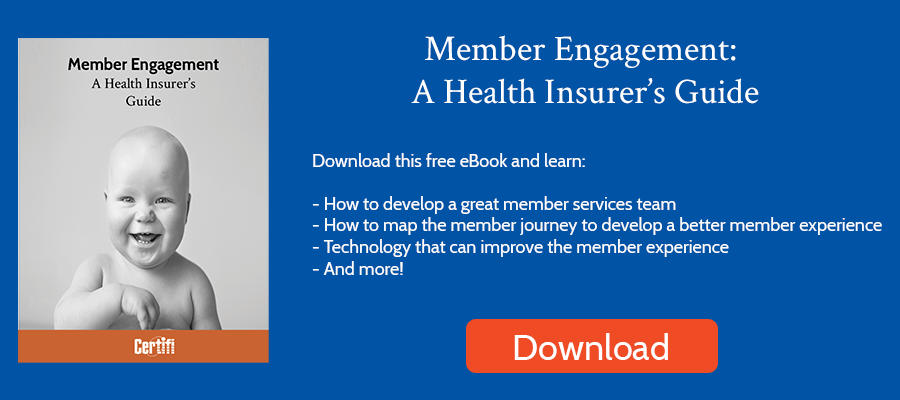Health insurance is competitive. The number of plans available on Affordable Care Act exchanges (ACA) has grown. The average Medicare Advantage member has 43 plans available to them.
Understanding available competitive and non-competitive new product offerings can help health plans generate ideas for future designs, partnerships, and product features. Here are five recent health insurance product design announcements worth noticing:
Tufts Health Plan Partners with Included Health
In January, Tufts Health Plan, a Point32Health company, announced a collaboration with Included Health to offer commercial members access to LGBTQ+ health resources. The company delivers guides and advocates that can provide personalized health benefits support and help Tufts Health Plan members navigate the healthcare system. LGBTQ+ care coordinators help members connect to the appropriate providers and introduce them to relevant social groups.
Tufts’ fully-insured commercial members had access to Included Health’s services as of January 1, 2023.
Why It Matters
According to a 2022 Gallup poll, 7.1% of U.S. adults identify as something other than heterosexual. Included Health data indicates that 40% of those in the LGBTQ+ community have experienced discrimination by a doctor. Those data points show a market need for tailored solutions that help the LGBTQ+ community access healthcare.
This approach portends the future of personalized health insurance. By understanding a member’s specific needs, whether LGBTQ+, pregnant, or managing diabetes, health insurance product design can tailor member access to the healthcare system to find providers and care solutions that best meet their needs.
BCBS Idaho Partners with Healthy.io
In December, BCBS Idaho and Healthy.io partnered to provide Medicare Advantage members with kidney damage testing kits. Healthy.io’s test enables members to test themselves at home. Members use a smartphone camera to complete the test and receive immediate results.
Why It Matters
Those at risk for chronic kidney disease should complete an annual albumin-to-creatinine ratio test. Yet, 80% fail to do so. It’s especially difficult for rural Idahoans, many of whom indicate that their primary care physician is 25 to 100 miles from their home.
By partnering with Healthy.io, BCBS Idaho hopes to improve test rates, especially in rural and underserved communities. By increasing the number of completed tests, the organization can likely detect chronic kidney disease early, reducing costs.
Insurers continue to invest in at-home test processes that make it easier for members to maintain their health. Preventative measures can save insurers money, so easier testing is attractive.
Superior HealthPlan Partners with MedArrive
In December, Superior HealthPlan, a subsidiary of Centene that delivers a Medicaid managed care plan in Texas, announced a partnership with the in-home care provider, MedArrive. MedArrive’s team of care providers visits the homes of enrolled members, delivering in-home care, diagnostics, health assessments, and other preventative health measures.
Additionally, MedArrive’s partnership with Brave Health enables Superior HealthPlan Medicaid members to access virtual behavioral health services. Approximately 40,000 Superior HealthPlan members will have access to MedArrive and Brave Health services.
Why it Matters
In-home care, especially for Medicaid members with limited transportation, a disability, or other impediments that limit access to healthcare, can help improve health outcomes and reduce costs. MedArrive touts that they can reduce hospitalization by 30% through their in-home care. Insurers investing in in-home care can reduce costs and improve member satisfaction.
CareFirst BCBS Partners with Live Chair Health
In January, CareFirst Blue Cross Blue Shield announced a partnership with Live Chair Health to improve health access to Medicaid members in Baltimore city and Prince George’s, Montgomery, and Baltimore counties.
Live Chair was founded in 2020 to reach underserved community members in salons, barbershops, and other community-based organizations like faith organizations and housing developments.
The organization will contact CareFirst members monthly to help them understand their benefits, choose a physician, and schedule an appointment. Live Chair will also work with the CareFirst care management team to address any identified social determinants of health.
Additionally, Live Chair is working with CareFirst to increase lead screenings in children. Live Chair plans to run lead-based educational events, contact residents to discuss lead screenings, and schedule screening appointments.
Why It Matters
CareFirst, like many Medicaid managed care organizations, has found that 40% of its Medicaid beneficiaries have failed to see a primary care physician in the past year. Preventative care can significantly reduce expensive hospital stays or emergency department visits.
Like CareFirst, many health insurance companies see value in partnering with community-based organizations to reach traditionally difficult-to-reach populations. Live Chair offers a unique model, educating these populations where they are.
UnitedHealthcare and Optum Offer Virtual Behavioral Coaching Program
Effective January 1, 2023, over 5 million UnitedHealthcare commercial members gained access to a virtual behavioral coaching program administered by Optum. The program helps adults with mild depression, stress, and anxiety. Members receive a dedicated behavioral health coach who tailors an eight-week program to the individual’s needs through 30-minute weekly audio or video calls. Content and resiliency tools are also available.
Why It Matters
Health insurers continue to invest in behavioral health programs and partnerships that provide value-added services to commercial self-insured members. Not only does it help UnitedHealthcare remain competitive, but it could save the insurer money. Studies have shown that healthcare costs for those with behavioral health conditions are 3.5 times higher than those without such concerns. Moody’s analysts indicated that insurers that integrate behavioral health and medical health have a competitive advantage.
The COVID pandemic may also have accelerated the need for behavioral healthcare in health insurance product design. The Centers for Disease Control and Prevention (CDC) data suggests there was an increase in the number of adults reporting behavioral health conditions compared to pre-pandemic years. Seeing more demand and the opportunity to reduce spending has several high-profile insurers investing in behavioral health care.
Certifi’s health insurance premium billing and payment solutions help healthcare payers improve member satisfaction while reducing administrative costs.



